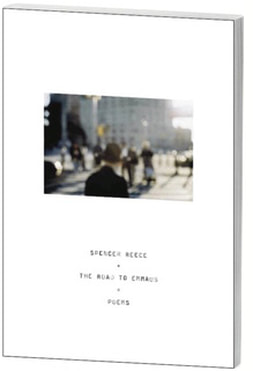|
Reading this new volume from Spencer Reece has made me realize how much I miss the moderns. This is absolutely not a poetics of “fiery tempered steel” (to use a phrase from H. D.). I think how many of Ezra Pound’s "Don’ts" Reece seems unconcerned with breaking. Two salient ones might be “use absolutely no word that does not contribute to the presentation” and "don’t shirk all the difficulties of the unspeakably difficult art of good prose by chopping your composition into line lengths.” Reece’s book, "The Road to Emmaus," consists mainly of narrative poems, many of which have the effect of short prose vignettes, some of which are quite powerful with well-drawn scenes and characters. But often, the poetry seems absent. It is as if Reece chopped up a prose tale into lines. Take this strophe from the titular poem as an example:
These lines lack any sense of urgency; no sense of the magic or mystery of language or experience resides here. These lines merely function to move the narrative along, but even as servants for transition these lines are too loosely constructed. It’s hard to imagine a worse line, in rhythm or imagination, than “that not long after the cloister closed, Durrell’s sister located me.”
Reece gives himself too much leeway for the mundane, for the offhand remark. Part of this is due to Reece’s insistence on autobiography. Otherwise excellent poems are weakened by Reece’s need to give us facts—simply because they actually happened, not because they fit the poem. Take the opening poem, “ICU,” as an example of both the best and worst of Reece’s tendencies:
The deeply haunting ending of this poem is probably the high point of the volume. But go back to the opening six lines. There is no reason to tell us that the speaker drove down I-91 to get to the ICU. And why do the elms have to be discussing anything, especially genealogies? This is a false note. Let the elms be elms. And, even if it were relevant, somehow, to mention taking the Myers-Briggs test, why do we need to know that the speaker took it with Sister Margaret, who plays no other role in the poem? Details such as these clog not only this otherwise fine poem, but they diminish the strength of many other poems in this book.
But Reece does have talent. Look at how “ICU” comes to its close. First, the description of the newborns is strikingly presented through figurative language that provides clarity and insight: their skin “mottled mildewed wallpaper” and “their eyelids the film on old water in a well.” And then there’s the wonderful phrase, “A Sunday of themselves,” which centrifugally expands the possibilities of the description. I suppose that Reece means that they are in a state of constant Sabbath, an enforced rest period. But it also suggests their lives have their own fixed sequences, ministered to by nurse and doctor-priests who perform, like liturgy, like ritual, the same necessary tasks each hour for them. And it can also mean, I suppose, that they are each special in themselves, worth celebrating. Then, as the babies watch him (giving a nice double meaning to “ICU”), Reece reaches into the realm of mythology to ground the image of the modern circumstance in the more resonant chambers of meaning that have been standing for centuries. And he does this well, comparing the situation to Orpheus, and interpreting, for us, Orpheus’s story as more a matter of tragic fate than of anything else. So, with Tennyson, Reece says, “Tis better to have loved and lost than never to have loved at all”—but he says more. I believe this pitiful picture of the neonatal infants is a portrait of our world. We are all like this. We all reside “resigned in plastic attics,” and we are all hooked to devices that we can’t live without, “nests of tubes.” We are all weak, dependent on others, even when we deny it. But these children, blind seers, can’t be fooled. The book’s thematics teach us that we are all on the Emmaus Road, where we will find the one we are looking for, where we will lose the one we’ve found. Just as Christ promised we would find him in “the least of these,” the characters that populate Reece’s Emmaus Road come from the margins of society, most from the margin of sexual identity. And since Reese hides little of his own life in these poems, it is clear that he, himself, exists on that margin as a gay Episcopal priest. Often the poems share moments from gay support groups and “coming out” meetings. The portraits of these characters are often exquisitely drawn, especially the portrait of the “impoverished aristocrat” and transvestite, Durell, in the titular poem, and the portrait of the baroness, in “Monaco,” who “exuded isolation as if it were a scent” and who “had the cultivated dignity of those who withhold their lives.” Reece’s portraits are exact, and through their exactitude, they point to moral truths. Note Reece’s deft picture of the baroness, this “mannish” aristocrat, rumored to be a lesbian, as she “shrugged / with the weight of candy and age” the “many crevices” in her flabby physique “compacted with talc” as she placed “another biscotto behind her lips / which were puffed up and shaped not unlike luggage handles.” The baroness’s existence, fixated on the beautiful, cloistered in luxuries and biscotto, is largely a lie. Her face is heavy with makeup, her hair dyed red and “her eyes fixed in surprise with Botox.” This baroness has islanded herself, and made a small world out of what should have been a larger one. Thus Reece sings, “Monaco, Monaco— / frivolous, ridiculous, minuscule.” This island city with island people, cut off from the suffering of the world, its people distracting themselves from the suffering they experience themselves, is incapable of maturing into a meaningful existence. And so Reece ends the poem with these words:
These are dollhouse people in an artificially condensed world. They have entrapped themselves in these zoo cages, refusing to be let out, and they are a feast for the rest of the world’s eyes. They condemn themselves to the small life of small talk.
The first part of the book moves effectively from the dollhouse of Monaco out onto the Emmaus Road, into a more expansive world where readers encounter modern-day misfits and outcasts. With all of these figures, Reece demonstrates how a life open to listening, as Christ listened to the woman at the well, can lead to abundance, an expansion of being. As he says of Durell, “the more he loved me, the more I loved the world.” But the book fumbles to its close as Reece turns more and more toward the purely confessional. “The Prodigal Son,” “Hartford,” and “12:20 in New York” detail Reece’s unresolved problems with his family. He relies too much in these poems on readers’ sentiments toward him. Maybe we’ve come, over the course of the book, to care, personally, for this gay poet-priest and his personal affairs. If so, then these poems might work, but I see little value in them other than Reece’s own personal expiation. In the end, Reece is too interested in himself for me to be exceedingly interested in the poetry. When Reece delicately, sensitively portrays his outcasts, his poems solidify into energetic coherence, but when he makes himself the main character, they flatline into preciosity. “Among School Children,” a poem that, like “ICU,” ends brilliantly, begins with feigned self-deprecation that, like any feigning, strikes the wrong note. He says, as he tells of his conversation with a Honduran taxi driver, “I was becoming a priest, I told him, God willing—Soy un sacerdote / (the tense wrong, the article unnecessary, the r rolled too strong).” This is flab on an otherwise fine poem. Reece is, here, caught up in his own personality, his concern for how others perceive him. He is ashamed that his work in Honduras might make him come off as “holier than thou,” so he must show that he makes mistakes just like anyone else. But I don’t want average Joes for my poets; I want prophets. I don’t care whether he rolls his r's imperfectly or not, or whether he is gay or straight, or whether he resolves the difficulties between himself and his parents. I care only that the poems create a space within my life for sublimity. And so I miss the moderns. It was T. S. Eliot who said that poetry “is not the expression of personality, but an escape from personality.” Sensitivity is Reece’s gift, and he seems to know this, but he uses this gift to reflect his own personal crises and refuses to shape these sensitivities into anything more definite. Overall, the volume suffers from structural and ideological looseness that I believe unfortunately characterizes our postmodern age. It is a shame Spencer Reece has let his considerable talent be defined by his age. The best poets, with the rigor of Pound, Williams, and Eliot, are striving, even today, against loosening energies to construct an architectonic verse that will stand much longer than will any personality. No one can stand anyone’s personality for very long. |
The Road to Emmaus: Poems. By Spencer Reece. Farrar, Straus and Giroux, 2014.
|
CURRENT ISSUE
|
CONTACT
|
DEPARTMENT OF ENGLISH
|


